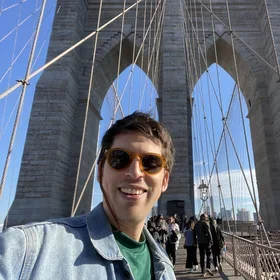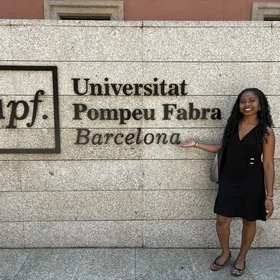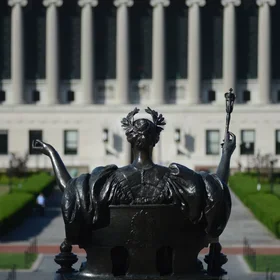By Camryn Louder, Student in the M.S. in Sustainability Science Program, School of Professional Studies
Immanuel Deo is currently a Master of Science in Sustainability Management (SUMA) student. In the program, Deo has served as a course reader for Critical Urban Infrastructure for Sustainable Development with Peter Marcotullio and Climate Risk and Scenario Analysis with Dr. Satyajit Bose and Dr. Dong Guo, and was recently honored with the Leadership and Community Stewardship Award.
Growing up in Indonesia, a beautiful archipelago country with 17,000 islands and the world's largest nickel reserves, Deo’s passion for sustainability is deeply rooted in the environmental and community challenges he saw firsthand. Beyond his academic and professional journey, he has explored 35 national parks across the U.S. with a goal to reach 40 by spring and visit all 50 states by mid-June. His travels have deepened his understanding of communities and their needs, reinforcing his belief that, as global citizens, we can all make a difference.
Why did you apply to the Sustainability Management program?
I applied to the program with a clear vision to establish sustainable villages and cities that are energy-independent, powered by locally sourced renewable energy, and built on a foundation of impact investing and strong financial structures. These communities would coexist with nature, integrating conservation efforts while equipping people with the knowledge to tackle climate change through local practices.
What have been some of the most valuable things you've learned in the program?
The SUMA program has truly expanded my understanding of how to bridge sustainability goals with real-world implementation. Courses like Critical Urban Infrastructure for Sustainable Development with Peter Marcotullio broadened my perspective on identifying key development parameters in the energy sector for villages and cities. One of the most valuable lessons I learned is that while technical solutions exist, the biggest barriers to progress often lie in the lack of fit-to-purpose investment models and optimal financing structures. To explore this further, I took Impact Finance for Sustainability Practitioners with Bhakti Mirchandani and Financing the Clean Energy Economy with Curtis Probst. These courses, taught by experienced practitioners, gave me practical insights into structuring financial solutions that can drive meaningful impact.
How has your professional experience shaped your perspective?
Before coming to Columbia, I served as the Chairman of the UNESCO Global Geoparks Youth Network (2021–2024), working to empower young people in rural villages with green leadership skills, climate awareness, and sustainable economic development strategies. This role gave me the chance to travel and engage with communities in UNESCO Global Geoparks around the world—places where geological heritage, biodiversity, and human culture intersect to create sustainable communities. My travels took me to locations in Thailand, Peru, Chile, Tanzania, Morocco, Mexico, Portugal, and Italy, where I worked closely with local leaders to understand how they are preparing the next generation for sustainability leadership. These experiences have reinforced a crucial message: sustainability is not just about technology or policy—it’s about people, connection, and action. This reminded me of why I came to Columbia—to learn how to bridge worlds, to connect those who seem far apart, and to create real solutions that benefit everyone, not just the privileged few.
Beyond the SUMA program, how has the School of Professional Studies shaped your mission to support the development of sustainable communities?
Columbia’s School of Professional Studies (SPS) embodies the idea of expanding the reach of an Ivy League education so that we, as students, are not just advancing our own careers, but learning how to drive impact. Columbia has taught me that education is not just about individual success; it’s about leveraging knowledge and networks to uplift others.
Columbia has played a crucial role in helping me connect global challenges with practical solutions. As I move toward graduation in 2025, my goal remains clear: to create communities that thrive through sustainable infrastructure and responsible investment. In doing so, I will uphold the idea that with privilege comes responsibility. We, as the next generation of leaders, have the power to shape policies, launch businesses, and create solutions that impact real lives—if we are willing to step beyond what’s comfortable.
As Deo prepares to graduate, his mission remains the same: to turn ideas into action, to help communities thrive through sustainable infrastructure and responsible investment, and to ensure that the solutions discussed in places like Columbia reach the people who need them the most.
About the Program
The Columbia University M.S. in Sustainability Management program, offered by the School of Professional Studies in partnership with the Climate School, provides students with cutting-edge policy and management tools to help public and private organizations and governments address environmental impacts and risks, pollution control, and remediation to achieve sustainability. The program is customized for working professionals and is offered as a full-time and part-time course of study.
The Sustainability Management program fosters creativity and adaptability by equipping students with the skills to tackle real-world sustainability challenges through an interdisciplinary approach from the world’s premier sustainability academics, researchers, and practitioners. The up-to-the-minute curriculum and flexibility prepare graduates for careers in the dynamic and rapidly changing field of sustainability.
Learn more about the program here.


